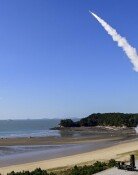Former CEO Recalls Late Samsung Group Founder
Former CEO Recalls Late Samsung Group Founder
Posted February. 01, 2010 08:00,
A former Samsung Corp. CEO, identified only by his surname Sohn, joined the Samsung Group in the conglomerates first open recruitment in 1957. He became CEO in 1977 in his 40s, a rare feat at the time.
The interviews for the first open recruitment in 1957 were personally conducted by group founder Lee Byung-chull. Sohn stayed at Samsung until 1978 and later served as CEO of Hyosung Heavy Industries and vice president of the Dongbu Group. He is now an auditor for the Sejong Foundation.
Back then, Sony Matsushita would not even consider making us an alliance partner. But now, Samsung Electronics is way ahead to much satisfaction, Sohn said. He was so busy recalling the past in The Dong-A Ilbo interview of more than an hour that he did not finish his cup of coffee.
○ Two full days for interviews
Samsung founder Lee Byung-chull interviewed each applicant even when the group was hiring hundreds of new employees. Even when I was a CEO, he spent two full days on interviews. CEOs asked the questions while Lee silently observed the applicants character and personality. Such devotion showed how much interest he had in talent, Sohn said.
The founder also thoroughly observed the interviews to prevent losing any potential stars, he added. Though CEOs tended to align interview scores with those of the written application test, Lee did not look at the latter.
While only focusing on the interviews, he put an O next to those Samsung should hire and an X next to those whom he felt would not fit in. Consequently, those with an O would get hired even if their written test scores were low, while those with high test scores but with an X would be screened again in a separate meeting.
The process was reportedly conducted free from external pressure or special considerations.
Those who frequently moved between posts meant they were especially valued by Lee. He would assign outstanding talent regardless of age to important posts or to places needing help, Sohn said.
Lee had a strict policy for talent development. In particular, CEOs always had to have basic figures on products in their minds based on Lees belief that a good strategy always comes from a thorough understanding of the products values.
After he left the company in the hands of CEOs, he summoned them a week later. He would ask questions such as How much is the total cost? and What is the personnel cost among the total? since Samsung revolves around manufacturing. Any hint of hesitation in answering meant failure. He would summon the CEOs once again the week after, Sohn said.
○ Contributing to the nation through taxes
Lees complete trust in his subordinates was the most striking feature of his leadership, Sohn said. I never saw him authorize any documents. He also said, Ive never handled any documents for approval after starting the business. Lee delegated full authority to his subordinates based on trust, and that was why the person in charge was motivated to work even harder. I believe this is the unique part of Lees leadership, Sohn said.
Lees decisive leadership made Samsung Electronics what it is today, Sohn said. Back then, the group was considering new growth businesses such as petrochemicals and machinery, but Lee pushed electronics for its potential.
The group faced a great backlash from the industry when it began its electronics business at the end of the 1960s. The industry cooperative as well as Gold Star (now LG Electronics) severely opposed Samsungs entry. Nevertheless, Lee pushed ahead with the business based on his conviction of its potential. He already knew what growth momentum meant in todays terms. If the group had chosen petrochemicals or mechanical engineering, the Samsung we know today would not exist, Sohn said.
Lees decisive leadership was founded on thorough research. He conducted in-depth research on new businesses and invited input from outside experts.
If you were the head of planning and research, you had to stay alert no matter what since Lee was extremely meticulous. You had to come up with a thorough analysis and projections. When we began Cheil Textile, the head of planning and research was in charge of analyzing growth potential. Lee wanted to know how the business grew in accordance with the changes in national income and demographics in other countries. He failed to satisfy Lee, however, and had to leave the company in the end, Sohn said.
A few days after the interview, Sohn called the Dong-A reporter and said, Id like to add one more thing. When the company did its tax calculations, Lee said, If a company grows and generates a lot of tax revenue and jobs, this will be a great way to contribute to the nation. In other words, he wanted to contribute to the nation by driving his business. I hope his successors at Samsung keep Lees ideals in mind and continue their current success to promote Koreas national brand.
achim@donga.com







